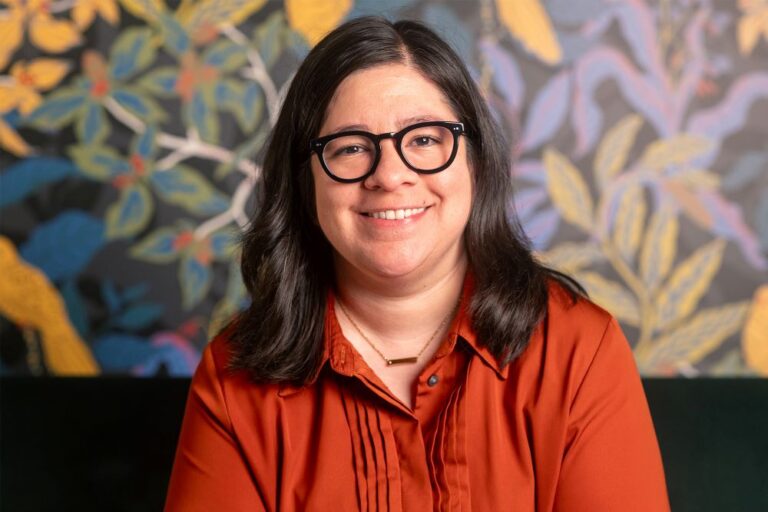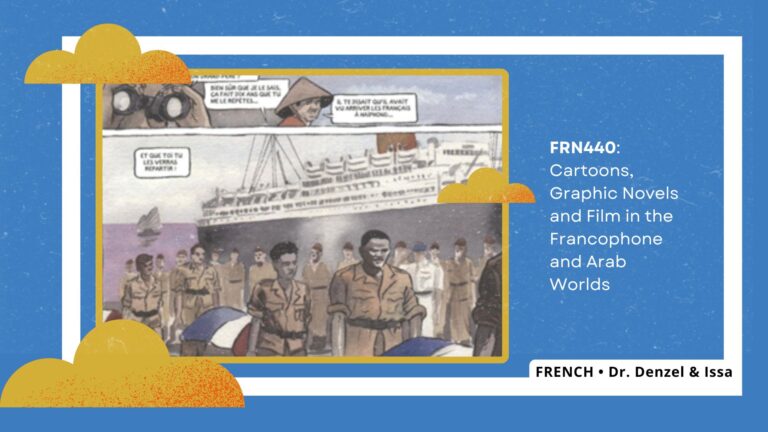It’s not often a student receives $25,000 to support their research, but that’s exactly what Hannah Olsen succeeded in doing as a recipient of the highest amount awarded by the Jeanne Marandon Fellowship.
Offered by the Société des Professeurs Français et Francophones d’Amérique (Professional Association of French Professors in the U.S.), the Jeanne Marandon Fellowship is for students of French who wish to study and/or conduct research in France or Québec.

Olsen is a doctoral student in French and Francophone Studies at Michigan State University and a Teaching Assistant in MSU’s Department of Romance and Classical Studies. With the support of the Jeanne Marandon Fellowship, she will travel to France to research how the legalization of contraception and abortion in that country has impacted the lives of women. Her research also is supported by a grant she received from the Center for Gender in Global Context at Michigan State University.
“I’m incredibly thrilled and feel very lucky and privileged to get these grants,” Olsen said. “This means I can spend the entire 2023-2024 academic year to really focus on my research for my dissertation and that opportunity is not often afforded.”
Olsen says she first became interested in her research topic while enrolled in a graduate course taught by Elizabeth Tuttle, Assistant Professor of French in the Department of Romance and Classical Studies.
“I’m incredibly thrilled and feel very lucky and privileged to get these grants. This means I can spend the entire 2023-2024 academic year to really focus on my research for my dissertation and that opportunity is not often afforded.”
The sale of contraceptives, birth control promotion, and abortion were made illegal in France after World War I, largely to encourage population growth. Decades later, the French government passed a law in 1967 authorizing the sale and use of contraception, followed by the legalization of abortion in 1975. Yet, the 1920 law prohibiting the spread of ‘anti-conception propaganda’ remained in place, thus contraception wasn’t encouraged and access to information about contraception and reproductive health wasn’t readily available.
“There was this tension at the time because contraception and abortion were legal, but it was illegal to publish information about them until the early ’90s. Sex education also didn’t really exist at this time either,” Olsen said. “It’s an odd gray period that I’m looking at, specifically from 1975 to the early ’90s when the French government began allowing ads and information about condoms to be publicized, especially because of the AIDS epidemic.”
Olsen says she started her research project with a comic book she found in the Special Collections at MSU Libraries, which has one of the most extensive collections of Franco-Belgian comic books in the country.

This comic book was published by a group of French high school girls in 1978, which was a few years after abortion was legalized in that country. The comic features characters based on the high school girls, their families, friends, and boyfriends. Though it told a narrative with speech bubbles, the subject matter featured factual information about male and female reproductive systems, basic gynecological care, various forms of contraception and how to use them, and how one could access contraception or abortion services.
“I was curious why these girls felt the need to make this and publish it. Why did they want to share this information? What I began to discover is there was an abundant lack of sex education at that time,” Olsen said. “Even though women could access contraception, they didn’t understand how it worked or how to access it, or there were lots of fears. Things like, ‘If I take the pill, will it make me unable to have children later in life?’ Those kinds of fears.”
The comic book also cited the groundbreaking book, Our Bodies, Ourselves, first published in 1970 by the Boston Women’s Health Book Collective. According to Olsen, handmade or hand-printed comic books and fanzines were very popular with French teenagers with hundreds, if not thousands, of little pop-up publications occurring during this period that she is researching.
“What I began to discover is there was an abundant lack of sex education at that time. Even though women could access contraception, they didn’t understand how it worked or how to access it, or there were lots of fears.”
However, Olsen is mystified how this specific comic book written 45 years ago by some high school girls a continent away ended up at MSU.
“As far as I can tell, it was published in very small quantities, maybe only a few hundred copies,” she said. “The only other copies I could find were at a very obscure comic book collectors’ website in England, where it was for sale for 50 pounds. Then there are two other copies in the National French Library archives. That’s it. And yet we have one at Michigan State.”
What started with a comic book published in Paris and found at MSU has led Olsen to search for archival documents from the 1970s and 1980s to try and understand how women shared information about abortion and contraception as well as how they used literature, film, and other forms of art to represent their experiences.
Olsen will travel to France this year to review several documents that can be found in the archives of the Bibliothèque Nationale de France, or the National Library of France, in Paris. Besides women’s magazines and self-published publications, some of the documents she will look at are medical studies and interviews doctors conducted in family planning centers with their patients. She also wants to visit some family planning centers and see if they have more interviews with patients that they would be willing to share.

“Every step leads me to the next,” Olsen said. “I found this one comic book and now there’s this plethora of other documents I need to look at in order to answer some of the questions I have. Right now, I have a list of about 100 documents that I’ll be looking at with the support from these grants.”
The grants also will allow Olsen to do research in other parts of France. She says if women in Paris were having a difficult time accessing information about contraception and abortion during this time period, then women in rural areas and in immigrant communities were probably at even more of a disadvantage in terms of lack of access to reproductive information. Olsen hopes to also learn how that lack of access impacted their perceptions of themselves as women, as wives, etc.
Olsen plans to make two trips to France during the 2023-2024 academic year, one from October to December and another in the spring.
Though documents are her primary focus, she says she may try to find one or more of the high school girls – now women likely in their sixties – who wrote the comic book. Compared to having spent just two days in France last summer, Olsen says having this time feels like a luxury that may enable her detective work to continue beyond the paper trail.
“Every step leads me to the next. I found this one comic book and now there’s this plethora of other documents I need to look at in order to answer some of the questions I have. Right now, I have a list of about 100 documents that I’ll be looking at with the support from these grants.”
While her research focuses on contraception and abortion in France in the late 20th century, she says there has been an overwhelmingly negative reaction in France to the U.S. Supreme Court’s recent decision to overturn Roe vs. Wade.
In France, abortions are free for anyone covered under the French healthcare system, and an estimated 75 percent of French people support a woman’s right to choose. In the wake of the overturn of Roe vs. Wade, some French politicians are now calling for the French law legalizing abortion to be elevated to a Constitutional right.
“The French are very aware of what’s happening in the United States,” Olsen said. “A lot of people in France basically say, ‘We don’t want that to happen here.’”
Olsen, who grew up in Chelsea, Michigan, earned her M.A. in French from Michigan State University. She also has a graduate certification in Women’s and Gender Studies from the Center for Gender in Global Context at MSU. She has taught French courses at MSU at the 100, 200, 300, and 400 levels as a Teaching Assistant and Instructor and has worked with a study abroad program in Belgium since 2017 through the Broad College of Business. She also has served as an Academic Adviser to undergraduate Spanish and French minors.
(Written by Lynn Waldsmith)


